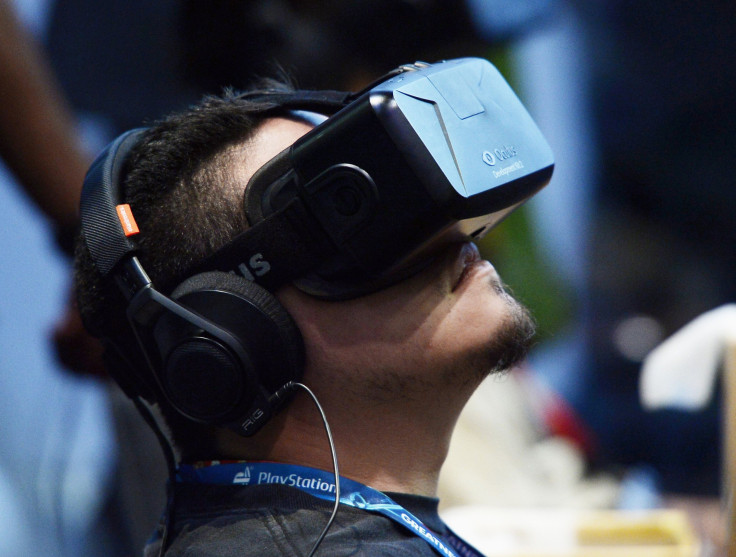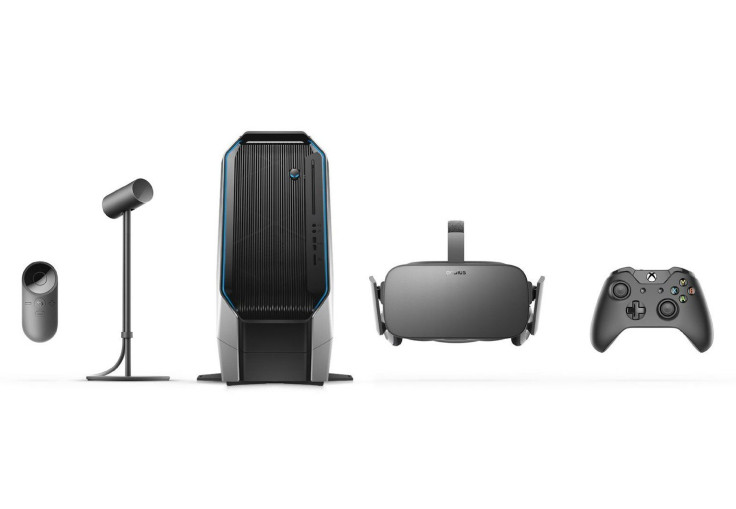The Oculus Rift launch comes with endless possibilities for the way we consume entertainment. Will it run smoothly? Will I experience motion sickness? These are just a few questions consumers have when considering if the Oculus Rift is worth its hefty $599 price tag. New technology comes with its growing pains and the stigma of first-gen products, but there are reasons behind the Oculus Rift’s perceived flaws and limitations.
iDigitalTimes spoke to Brian McRae, founder of Fenix Fire Entertainment and one of the pioneers behind the Oculus Rift design, about the VR headset and the company’s post-launch plans.
McRae began working on the Oculus Rift early 2013 when the company recruited him based on his experience on environment art. Before joining the Oculus team, McRae worked at Blizzard, Midway, and High Voltage Software. McRae’s first task was to brainstorm the environment for the development kit and worked on several prototypes for the company. Check out what McRae had to say about his experience designing the Oculus Rift below.
Can you comment on Oculus Rift’s design? Do you think the Rift design is superior to other VR headset?
Most of my experience with VR is with the various prototype headsets and dev kits that Oculus created, aside from some exposure to early headsets from the 90's. When I first put the headset on I was immediately excited by stereoscopy and the removal of the peripheral view which essentially forced me completely into the virtual space. Then you have the head tracking which allows you to look around the space naturally and intuitively. My immediate reaction to Oculus' VR was that "this is the environment artist's dream" as it puts the digital environment around you in an extremely intimate way. Other aspects such as weight, resolution, and sound have all continued to improve and I would expect these features to improve as we enter the VR hardware wars of 2016 and beyond.
Motion sickness is a big concern for VR. How do you combat this? Is it more about the way a game is designed than the actual headset?
Simulator sickness will not be the headset's fault. While motion sickness concerns will partially depend on the computing power of the system it's running on, motion sickness is far more impacted by the way the a game is designed. Developers need to limit graphically expensive features like shadows, reflective shaders, water, particles, camera lens FX and high polygon counts. Camera management is everything. The developer should avoid moving the camera automatically or should do so with great care. Rotating the camera automatically is even worse.

What were some of the biggest issues you faced working on Oculus? What was the best part of working for Oculus?
The best part of working with Oculus was being a pioneer with a bunch of super passionate people who really do want to change the world for the better. I can't stress enough how 100% committed the team is and how laser focused each developer is on establishing this frontier. The demons of VR were constantly discussed as their arch enemy: low framerate, poor head tracking, poor motion tracking, and basically anything else that contributes to simulator sickness.
While making the Tuscany Demo we were using a version of Unity that had no support at all for VR so we had to trick the graphics card and the Unity editor into thinking the VR headset was another monitor. You had to do this weird thing with your eyes to find the cursor to maximize the VR view in order to center the dual VR screens to the camera lenses. That, coupled with the need to constantly put the headset on and off made for some messy hair days! It's weird, you start to think that you're becoming one with the computer, getting closer and closer inside it somehow and leaving our “normal” reality behind.
Frame rate is really the bane of your existence while developing for VR. Having that frame rate at 90FPS or higher creates a much better experience than seeing shadows and fancy shader reflections. In fact, a lot of high end visual effects are distracting and overwhelming in VR since you are thrust so entirely into the VR experience. Clean art and soft lighting go a very long way in creating a pleasant experience while making sure the framerate maintains that high clip.
As you already know, the Oculus Rift controls aren't coming with the first shipments. How will that impact the user experience? Why wouldn't Oculus wait until the controls were ready to release the headset?
In my most recent visit to the Facebook campus I had the luxury of demoing their new hand controls. The addition of these controls really do make the experience even more intuitive since they allow you to interact, pick up, and hold digital props. With really good space calculation it can feel that you are actually lifting and holding items even though they are weightless. You end up feeling like a toddler learning to play with toys for the first time. It's magical, with almost a Disney feeling to it somehow.
The controls should be packaged in with the headset and I'm not sure why they're not other than logistics of manufacturing, proper SDK implementation for developers, and meeting the pre-order launch date expectations. In a perfect world Oculus should launch with the hand controllers. I'm sure they feel the same way.

What kinds of games do you think will be the most popular in VR?
Horror is perfect for VR due to the limitations of the hardware. Imagine walking in a haunted house with a flashlight. Players will need slow moving cameras and horror can work very well with this limitation. You also have the 3D positional sound which can work great with horror. Plus what makes the horror genre really terrifying is the removal of choice to escape. You have the headset on, you can't get away. You're in. It's perfect.
Mystery games like Myst can really dominate since they typically [use] slow-moving cameras and require an intimate environment experience. There are a lot of casual hidden object games that can come right over. If I was a Creative Director at PlayFirst I would be going big on bringing all their hidden object and murder mystery content to VR. This would be a great way to make a land grab for more women game players – that are a big percentage who play hidden object/murder mystery games - on VR. Women adopting VR could be a valuable key to VR market dominance.
Exploration games will be fused with RPG as a genre, which will essentially create a new breed of survival simulations. Allowing the player to be somewhere else and truly experience a different world could be akin to Avatar's Jake Sully's dream-walking avatar experience. Players will feel like they lead multiple lives, especially as multiplayer is explored in VR. This genre is one that my studio is exploring currently.
Table top and board games will be great party eSport experiences. You'll have a virtual board game or e-Sport arena parties with friends playing elaborate chess, Monopoly, or sport mash-up experiences, all while sitting in your underwear at home. Every toy maker and traditional board game manufacturer should be working with game developers to create compelling versions of their IP and exploring spin offs of their IP for some lucrative low hanging fruit. EA Sports should be all over this, too; any sport from a spectator seat will translate flawlessly.
Do you think VR headsets will become a household item five years from now?
There will be many moving parts in order for this to happen. Look at the Guitar Hero controller. It was a peripheral that gave a novel new experience to even the most casual of players. But the effect wore off after a few short years and now there's plastic guitars collecting dust next to TVs everywhere. The Rock Band and Guitar Hero craze died out because the experience didn't expand, and after the initial excitement wore off so did the life of this peripheral.
VR and Oculus will need amazing 2 nd party games that are built from the ground up only for VR. They will need a variety of styles and genres to hit all demographics and gamer tastes. 2 nd party games are a fantastic chance for Oculus to become the next Nintendo and have their Mario 's, Donkey Kong 's and Zelda 's, all specifically engineered to maximize the VR experience to the fullest.
VR experiences will naturally need to evolve. A perfect historical example is the evolution of the motion picture. When people viewed movies for the first time they were completely blown away and would pay good money to see a train coming at the screen only to literally jump out of their chairs as the train approached. These kinds of short experiences are to be expected, helping condition users of what is possible and for developers to experiment with the new visual language of the medium. VR will need its “Citizen Kane” to really showcase what is possible. So far I haven't seen the killer app experience for VR and I've experienced a lot of demos. VR needs the Mickey Mouse, the Snow White, the Pac Man , the Super Mario Bros , something that quintessentially and universally appeals to everyone and is created solely for the VR medium.

















